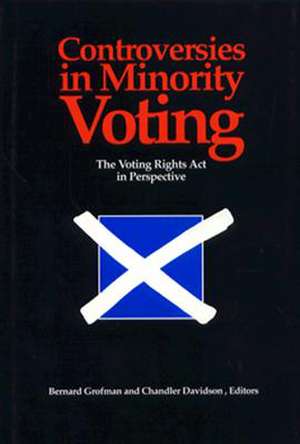Controversies in Minority Voting: The Voting Rights Act in Perspective
Autor Bernard N. Grofman, Chandler Davidsonen Limba Engleză Hardback – mai 1992
Widely regarded as one of the most successful pieces of modern legislation, the Voting Rights Act of 1965 has transformed the nature of minority participation and representation in the United States. But with success came controversy as some scholars claim the Act has outlived its usefulness or been subverted in its aim. This volume brings together leading scholars to offer a twenty-five year perspective on the consequences of this landmark act.
The Fifteenth Amendment, ratified in 1870, stated that the right of U.S. citizens to vote "shall not be denied or abridged by the United States or by any State on account of race, color, or condition of previous servitude." The South, however, virtually ignored this right, disfranchising blacks through violence, intimidation, literacy tests, and poll taxes. The primary purpose of the Voting Rights Act of 1965 was to break down these barriers to minority voting.
Beginning with chapters covering the key provisions of the Act, the book discusses the way the Act has transformed American politics and looks at the role played by major civil rights groups in lobbying for extensions and amendments to it and in insuring that its provisions would be enforced.
The Fifteenth Amendment, ratified in 1870, stated that the right of U.S. citizens to vote "shall not be denied or abridged by the United States or by any State on account of race, color, or condition of previous servitude." The South, however, virtually ignored this right, disfranchising blacks through violence, intimidation, literacy tests, and poll taxes. The primary purpose of the Voting Rights Act of 1965 was to break down these barriers to minority voting.
Beginning with chapters covering the key provisions of the Act, the book discusses the way the Act has transformed American politics and looks at the role played by major civil rights groups in lobbying for extensions and amendments to it and in insuring that its provisions would be enforced.
Preț: 229.65 lei
Nou
Puncte Express: 344
Preț estimativ în valută:
43.94€ • 45.79$ • 36.39£
43.94€ • 45.79$ • 36.39£
Carte tipărită la comandă
Livrare economică 03-17 aprilie
Preluare comenzi: 021 569.72.76
Specificații
ISBN-13: 9780815717508
ISBN-10: 0815717504
Pagini: 396
Ilustrații: Illustrations
Dimensiuni: 152 x 229 x 33 mm
Greutate: 0.72 kg
Ediția:Prescurtată
Editura: Brookings Institution Press
Colecția Brookings Institution Press
ISBN-10: 0815717504
Pagini: 396
Ilustrații: Illustrations
Dimensiuni: 152 x 229 x 33 mm
Greutate: 0.72 kg
Ediția:Prescurtată
Editura: Brookings Institution Press
Colecția Brookings Institution Press
Notă biografică
Descriere
Widely regarded as one of the most successful pieces of modern legislation, the Voting Rights Act of 1965 has transformed the nature of minority participation and representation in the United States. But with success came controversy as some scholars claim the Act has outlived its usefulness or been subverted in its aim. This volume brings together leading scholars to offer a twenty-five year perspective on the consequences of this landmark act.
The Fifteenth Amendment, ratified in 1870, stated that the right of U.S. citizens to vote "shall not be denied or abridged by the United States or by any State on account of race, color, or condition of previous servitude." The South, however, virtually ignored this right, disfranchising blacks through violence, intimidation, literacy tests, and poll taxes. The primary purpose of the Voting Rights Act of 1965 was to break down these barriers to minority voting.
Beginning with chapters covering the key provisions of the Act, the book discusses the way the Act has transformed American politics and looks at the role played by major civil rights groups in lobbying for extensions and amendments to it and in insuring that its provisions would be enforced.
The Fifteenth Amendment, ratified in 1870, stated that the right of U.S. citizens to vote "shall not be denied or abridged by the United States or by any State on account of race, color, or condition of previous servitude." The South, however, virtually ignored this right, disfranchising blacks through violence, intimidation, literacy tests, and poll taxes. The primary purpose of the Voting Rights Act of 1965 was to break down these barriers to minority voting.
Beginning with chapters covering the key provisions of the Act, the book discusses the way the Act has transformed American politics and looks at the role played by major civil rights groups in lobbying for extensions and amendments to it and in insuring that its provisions would be enforced.
